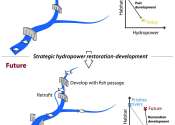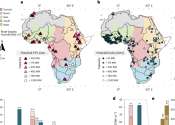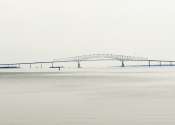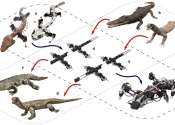A river is a natural watercourse, usually freshwater, flowing toward an ocean, a lake, a sea or another river. In a few cases, a river simply flows into the ground or dries up completely before reaching another body of water. Small rivers may also be called by several other names, including stream, creek, brook, rivulet, and rill; there is no general rule that defines what can be called a river. Many names for small rivers are specific to geographic location; one example is Burn in Scotland and North-east England. Sometimes a river is said to be larger than a creek, but this is not always the case, due to vagueness in the language.
A river is part of the hydrological cycle. Water within a river is generally collected from precipitation through surface runoff, groundwater recharge, springs, and the release of stored water in natural ice and snowpacks (i.e., from glaciers).









